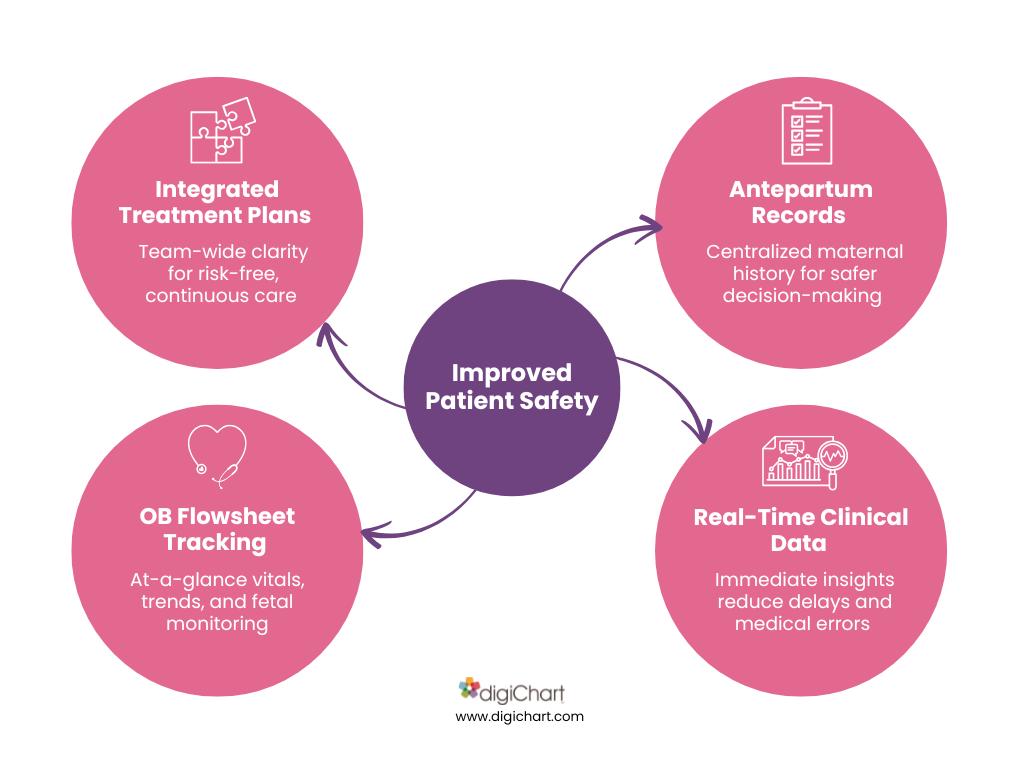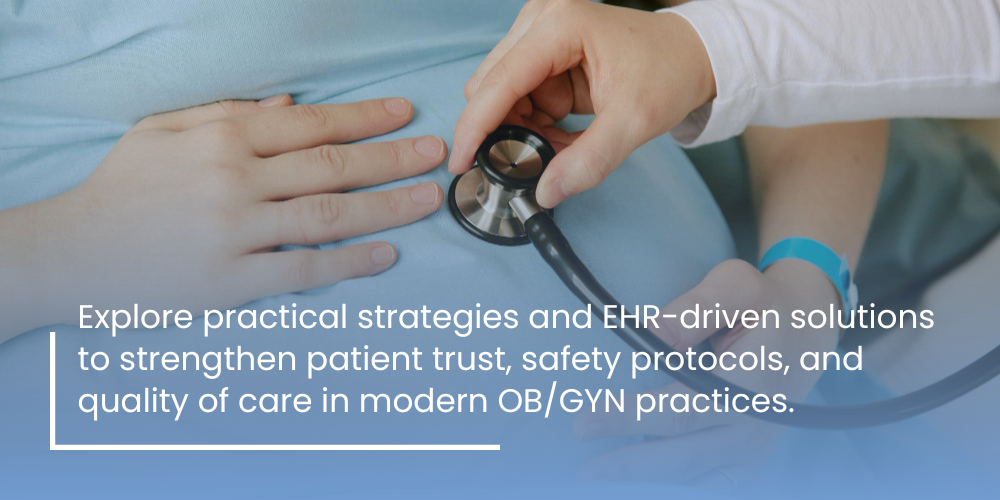Putting Patients First: Elevating Safety and Care in Your OB/GYN Practice
Today’s healthcare industry underscores the importance of patient safety in every OB/GYN practice. Women’s health is uniquely complex, and ensuring the highest standard of patient safety is not just essential but a critical responsibility. To ensure optimal outcomes, practices must integrate effective tools and strategies that enhance care delivery, communication, and operational efficiency.
Electronic health records (EHR) are one key tool that helps OB/GYN practices achieve these goals.
By adopting specialized systems like digiChart, practices can streamline workflow optimization, improve patient safety, and deliver compassionate care at every stage of treatment.
Understanding Patient Safety in OB/GYN Practices
Patient safety refers to preventing errors and harm to patients during the care process. This takes on added significance in an OB/GYN setting due to the wide range of treatments and care women require throughout their lives—from routine exams to pregnancy-related care and beyond. Prioritizing safety means ensuring that every patient receives accurate, timely, and individualized care.
However, the field of women’s health presents several unique challenges that OB/GYN practices often encounter:
- Miscommunication among providers: Given the multidisciplinary nature of OB/GYN care, breakdowns in communication between specialists and primary care providers can lead to missed or delayed treatments.
- Incomplete patient records: Inaccurate or incomplete health histories may result in inappropriate care plans and risk patient safety.
- Delays in care: Delays due to administrative backlogs or mismanaged records can seriously affect maternal and fetal health.
Addressing these challenges requires a proactive, patient-centered approach underpinned by technology like EHR systems, which are crucial in overcoming these obstacles.
The Role of EHR Systems in Enhancing Patient Care
EHR software systems are integral to advancing patient safety and improving women’s health outcomes in OB/GYN settings. These systems consolidate patient information, ensuring providers have complete, real-time access to a patient’s medical history and treatment plans.
The result is safer, more efficient care.
With digiChart, for example, OB/GYN practices gain access to several features specifically designed to support patient safety:
- Integrated treatment plans: By maintaining a single, centralized record of a patient’s care plan, EHR systems ensure that all providers are on the same page and can deliver cohesive, coordinated care.
- Electronic Antepartum Record: This feature offers a streamlined way to manage pregnancy-related data, making it easier for providers to track a patient’s health throughout pregnancy and take immediate action when necessary.
- OB Flowsheet functionalities: The OB Flowsheet simplifies tracking key health indicators, enabling quick access to critical information such as lab results, prenatal visit details, and fetal heart rate patterns, which helps reduce the risk of complications.
EHR systems like digiChart are crucial in optimizing patient care by ensuring that all care providers have access to accurate and up-to-date patient data.

Traditional OB/GYN Workflow vs. With digiChart
| Feature | Traditional Workflow | With digiChart |
|---|---|---|
| Record Access | Manual & time-consuming | Instant & centralized |
| Care Plan Updates | Risk of miscommunication | Real-time collaboration |
| Pregnancy Monitoring | Paper records or spreadsheets | Integrated OB Flowsheet |
| Patient Communication | Phone-based, delayed | Patient portal with real-time messaging |
Strategies for Elevating Care in Your Practice
Streamlining Workflow
EHR systems enable OB/GYN practices to significantly streamline workflows by automating routine documentation and record-keeping tasks. This reduces administrative burdens on staff, freeing them to focus more on patient care.
Specialized EHR systems like digiChart can streamline all aspects of prenatal care, from tracking fetal development and managing antepartum records to ensuring timely communication between providers, ultimately improving outcomes for both mothers and babies.
Automating tasks such as appointment scheduling, reminders, and follow-up care plans ensures a smoother, more efficient operation, reducing the risk of errors.
Improving Communication
Clear communication between providers and patients is critical to delivering compassionate care in any medical practice. EHR systems facilitate this by providing shared digital records that can be easily accessed by all providers involved in a patient’s care. This seamless collaboration prevents miscommunication and helps keep all providers informed, improving decision-making and patient outcomes.
EHR features such as patient portals also enable better communication between patients and providers. Patients can access their health records, receive test results, and communicate with their OB/GYN team in real time, leading to enhanced engagement and higher trust.
Best Practices for Implementing EHR Solutions
“Incomplete patient records contribute to 30% of OB/GYN diagnostic delays.” – Journal of Women's Health Tech
Integrating an EHR system like digiChart into your OB/GYN practice requires a strategic approach. Here are a few best practices:
Training Staff
Proper training is essential to ensure all team members are proficient in using the EHR system. Even the most advanced systems can lead to errors, inefficiencies, and frustration without thorough training. Comprehensive training sessions, including scenario-based learning and hands-on practice, should be provided during the onboarding process. Regular refresher courses will keep your team updated on new features and best practices, ensuring they remain confident and effective in using the system to its full potential.
Ongoing Support
Choosing an EHR provider with continuous support is vital to help troubleshoot issues and ensure smooth operation post-implementation. An EHR system should not be a “set it and forget it” tool. Practices must have access to dedicated support, whether it’s for technical challenges, updates, or general inquiries.
Regular system updates and reliable customer support ensure that the system continues to evolve and adapt to your practice’s needs while minimizing downtime and disruptions to patient care.
Continuous Evaluation
Regularly assessing the effectiveness of your EHR system will ensure it continues to meet the needs of your practice and improves patient safety. Implement a structured feedback process that allows staff to share their experiences with the system and identify areas for improvement.
Additionally, metrics like appointment wait times, patient satisfaction scores, and workflow efficiency can be used to measure the system’s impact on care delivery. This proactive approach enables you to fine-tune the system for maximum benefit, ensuring it aligns with your practice’s evolving goals.
Focusing on these key strategies, OB/GYN practices can successfully implement and optimize EHR solutions, improving patient care and operational efficiency.
Regular system updates and reliable customer support ensure that the system continues to evolve and adapt to your practice’s needs while minimizing downtime and disruptions to patient care.
Put Patients First with digiChart
At the heart of every successful OB/GYN practice is a commitment to putting patients first. Integrating advanced tools like digiChart can enhance patient safety, improve communication, and streamline operations while providing the personalized and compassionate care your patients deserve.
Prioritizing patient safety and leveraging the latest in health technology will give your OB/GYN practice the opportunity to continue to thrive but also significantly improve and elevate the standards of care for women’s health. The benefits are not just theoretical, but tangible and transformative.





